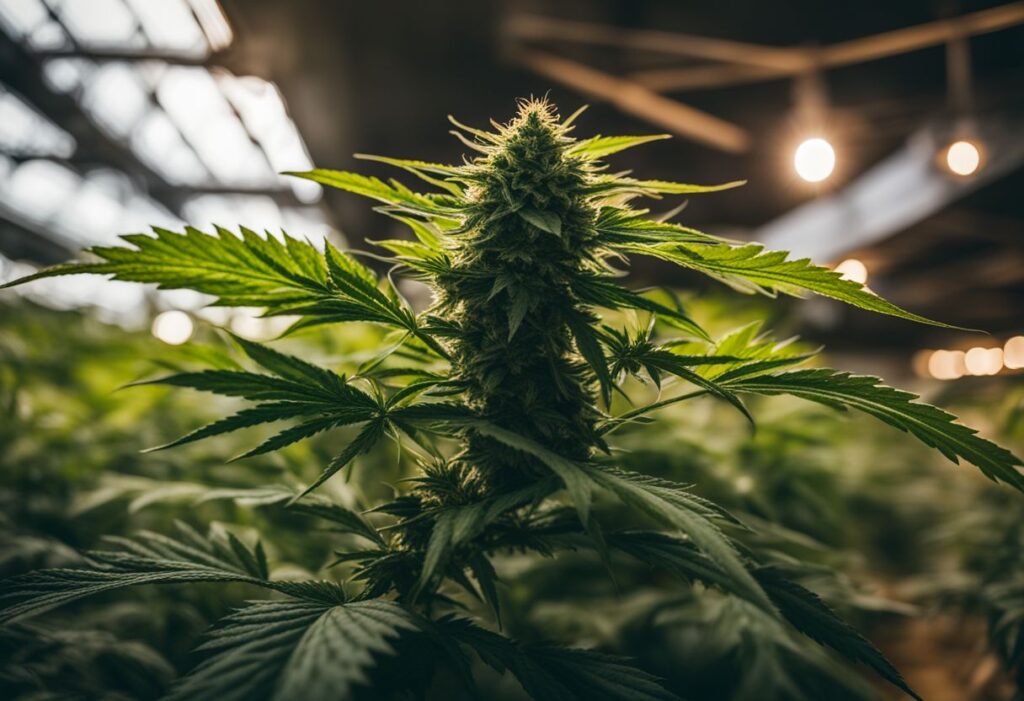In recent years, the cannabis industry has seen a surge of interest in cannabinoids beyond the well-known THC and CBD. One such cannabinoid that has been gaining attention is THCA, or tetrahydrocannabinolic acid. Unlike its more famous counterpart, THC, THCA is non-psychoactive in its raw form. However, it holds a wealth of potential benefits and unique effects that can elevate your cannabis experience. In this comprehensive guide, we will delve into what THCA flower is, its potential effects, and how you can incorporate it into your lifestyle.
What is THCA?
THCA is the acidic precursor to delta-9-tetrahydrocannabinol (THC), the main psychoactive component in cannabis. In its raw form, THCA does not produce the “high” typically associated with THC. This is because THCA must undergo decarboxylation—a process triggered by heat, such as smoking, vaping, or cooking—to convert into THC.
The Chemistry Behind THCA
Cannabis plants naturally produce cannabinoids in their acidic forms. When cannabis is harvested and exposed to heat, a chemical reaction occurs that removes a carboxyl group from the THCA molecule, converting it into THC. This transformation is responsible for the psychoactive effects that many cannabis users seek.
The Benefits of THCA
Although THCA doesn’t produce a high, it offers a range of potential therapeutic benefits. Research is still in its early stages, but preliminary studies and anecdotal evidence suggest several promising uses for THCA.
Anti-Inflammatory Properties
One of the most noted benefits of THCA is its anti-inflammatory properties. This makes it a potential treatment for conditions such as arthritis, lupus, and inflammatory bowel disease (IBD). Animal studies have shown that THCA can reduce inflammation, and many users report relief from inflammatory symptoms.
Neuroprotective Effects
THCA is believed to have neuroprotective properties, which means it could help protect nerve cells from damage and degeneration. This is particularly relevant for conditions like Parkinson’s disease and Alzheimer’s disease. Some studies have shown that THCA can help reduce the severity of neurological symptoms and improve overall brain health.
Anti-Nausea and Appetite Stimulation
THCA has also demonstrated potential as an anti-nausea and appetite-stimulating agent. This makes it particularly useful for individuals undergoing treatments like chemotherapy, which can cause severe nausea and loss of appetite.
Pain Relief
Like many cannabinoids, THCA is believed to offer pain-relieving effects. While it may not be as potent as THC in this regard, it’s a valuable option for those seeking pain relief without the psychoactive effects.
Potential Anti-Cancer Properties
Early research suggests that THCA may have anti-cancer properties. Some studies have found that it can inhibit the growth of cancer cells, making it a promising avenue for future cancer treatments.
How to Consume THCA Flower
Given that THCA is non-psychoactive in its raw form, consuming it requires a different approach compared to THC-rich cannabis. Here are some ways to incorporate THCA flower into your routine:
Raw Consumption
One of the simplest ways to consume THCA is by eating raw cannabis. Adding raw cannabis leaves or flowers to smoothies, salads, or juices is a popular method. This allows you to benefit from THCA without undergoing decarboxylation.
Tinctures and Oil
THCA tinctures and oils are another effective way to consume this cannabinoid. These products are typically taken sublingually (under the tongue) or added to food and beverages. Tinctures and oils offer a convenient and precise way to dose THCA.
Topicals
For localized relief, THCA-infused topicals such as creams, balms, and lotions are available. These can be applied directly to the skin to target specific areas of inflammation or pain.
Capsules
THCA capsules offer a convenient and discreet way to consume THCA. These are particularly useful for individuals who prefer a pill format over other methods of consumption.
Understanding the Effects of THCA
The effects of THCA can vary depending on the individual and the method of consumption. Here are some of the common experiences reported by users:
Non-Psychoactive Relief
One of the most significant advantages of THCA is its non-psychoactive nature. This makes it an excellent option for individuals who want the potential benefits of cannabis without the high. Users often report feeling relief from symptoms such as pain, inflammation, and nausea without any cognitive impairment.
Mild Euphoria
While THCA itself is non-psychoactive, some users report a mild sense of euphoria or well-being. This is likely due to the overall improvement in symptoms and the body’s endocannabinoid system balancing itself out.
Enhanced Focus and Clarity
Unlike THC, which can sometimes cause a foggy or sluggish feeling, THCA is often associated with enhanced focus and mental clarity. This makes it a suitable option for daytime use or for individuals who need to remain alert and productive.
Improved Mood
Many users report an improvement in mood and a reduction in anxiety and stress levels when consuming THCA. This is likely due to the cannabinoid’s interaction with the body’s endocannabinoid system, which plays a crucial role in regulating mood and emotional responses.
The Science Behind THCA
Understanding the science behind THCA is essential for appreciating its potential benefits fully. Here are some key points about THCA and how it interacts with the body:
Interaction with the Endocannabinoid System
The endocannabinoid system (ECS) is a complex cell-signaling system that plays a crucial role in maintaining homeostasis in the body. It consists of endocannabinoid, receptors (CB1 and CB2), and enzymes that break down cannabinoids. THCA primarily interacts with the CB2 receptors, which are more prevalent in the immune system, making it effective for anti-inflammatory and immune-modulating effects.
Terpene Synergy
Terpenes are aromatic compounds found in cannabis that contribute to its distinctive smell and flavor. They also play a significant role in the plant’s therapeutic effects. THCA-rich strains often contain a unique terpene profile that can enhance its benefits through the entourage effect. This synergy between cannabinoids and terpenes can amplify the overall experience and effectiveness of THCA.
Ongoing Research
While research on THCA is still in its early stages, ongoing studies continue to uncover its potential therapeutic applications. Scientists are exploring its role in various medical conditions and how it can be effectively utilized in clinical settings.
Choosing the Right THCA Flower
When it comes to selecting THCA flower, there are a few factors to consider to ensure you’re getting a high-quality product:
Source and Cultivation Practices
Choose THCA flower from reputable sources that follow organic and sustainable cultivation practices. This ensures that the product is free from harmful pesticides and chemicals, providing a cleaner and safer experience.
Lab Testing
Always opt for THCA flower that has undergone third-party lab testing. Lab results should confirm the cannabinoid content, terpene profile, and absence of contaminants. This transparency ensures you’re getting a product that meets quality and safety standards.
Strain Selection
Different cannabis strains have varying levels of THCA and unique terpene profiles. Experiment with different strains to find the one that best suits your needs and preferences. Popular THCA-rich strains include Harlequin, ACDC, and Cannatonic.
Integrating THCA into Your Lifestyle
Incorporating THCA into your lifestyle can be a rewarding experience. Here are some tips on how to make the most of this unique cannabinoid:
Start Low and Go Slow
If you’re new to THCA, start with a low dose and gradually increase it until you find the optimal amount for your needs. This approach allows you to gauge your body’s response and avoid any potential side effects.
Combine with Other Cannabinoids
Consider combining THCA with other cannabinoids like CBD or THC to enhance its effects. The entourage effect suggests that cannabinoids work synergistically, providing a more comprehensive range of benefits.
Keep a Journal
Keeping a journal of your THCA use can help you track its effects and identify patterns. Note the dosage, method of consumption, and any changes in symptoms or overall well-being. This information can be valuable for fine-tuning your THCA regimen.
Stay Informed
Stay up-to-date with the latest research and developments in the world of cannabinoids. As our understanding of THCA continues to grow, new insights and applications will emerge, offering even more ways to benefit from this remarkable compound.
Conclusion
THCA flower is a fascinating and versatile addition to the world of cannabis. Its non-psychoactive nature, coupled with a range of potential therapeutic benefits, makes it an attractive option for those seeking natural relief from various ailments. Whether you’re looking to reduce inflammation, protect your brain, alleviate pain, or simply enhance your overall well-being, THCA offers a unique and promising solution.
As research continues to uncover the full potential of THCA, its role in the cannabis industry is likely to expand. By understanding how to incorporate THCA into your lifestyle and choosing high-quality products, you can elevate your cannabis experience and enjoy the many benefits this cannabinoid has to offer.
Elevate your experience with THCA flower and discover a new dimension of wellness and vitality. Choose THCA and let its potential benefits enhance your overall quality of life. So, don’t hesitate to give it a try and see how it can positively impact your well-being. With the growing availability and diverse product options, there’s never been a better time to explore the world of THCA. Embrace this unique cannabinoid and start reaping its potential rewards today!
Happy exploring!


